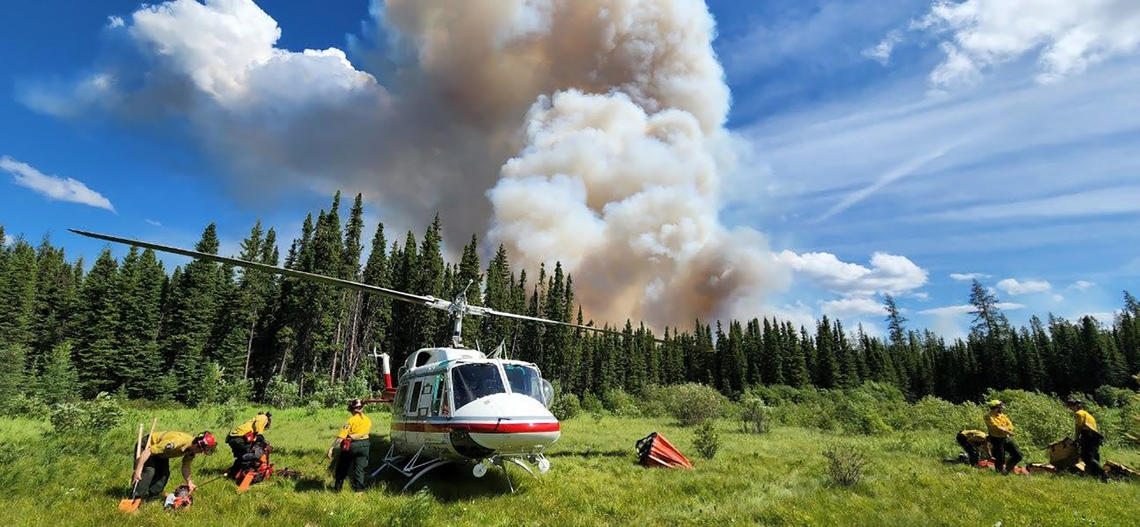Aug. 12, 2022
Let’s talk about the weather. Please!

Long the favoured topic for inconsequential small talk, discussing the weather may actually be the most important conversation people can have, says a UCalgary geoscientist.
Indeed, as Southern Alberta suffers through another week of heat warnings, Dr. Rachel Lauer, PhD, would like to see more people talking about heat, smoke and everything else that’s been a hallmark of recent summers, because local concern is key to driving politicians to action on climate change at a global level.
“Talking about it is a critical path forward, because we’re not going to get there without voices and actions and demands that we do something about this in a meaningful way,” says Lauer, associate professor of geoscience in the Faculty of Science.
Not too late to make a difference
Lauer’s interest in better-informed climate conversations led her to design a geoscience course that’s open to all university students, called Science of Climate Change. From a starting class size of 70, the course (GLGY 297.1) now welcomes 100 students from virtually every faculty.

Rachel Lauer
In both her course and in the community outside the university, Lauer wants people to talk about the weather, and more important, long-term climate — and she hopes people face the facts with the same optimism she has.
In short, Lauer says it’s not too late to reduce or reverse the impact of greenhouse gases, which are leading to higher global temperatures and filling the atmosphere with storm-generating moisture.
"I got very angry at a recent newspaper article that basically said, ‘We’re screwed, may as well give up,’ and to me, there is a lot to be done, a lot that can be done," she says.
“The biggest thing we can do to combat climate change is to give people the tools to talk about it, arming them with the information they need to talk to politicians, leaders, and even the campus president.”
Course addresses issue facing all students
That’s a key reason Lauer started the Science of Climate change course at UCalgary. Calgary didn’t have a course like it, and an article in the Gauntlet student newspaper suggested it would be welcome. She says:
I think it would be irresponsible to not have a course addressing one of the biggest problems our students will be facing in their lives.
With students from all areas of study, Lauer has encouraged final projects that play to students' interests and strengths, leading to submissions ranging from art to Tik-Tok videos and podcasts. Any medium is welcome, so long as the focus is on a specific locale and how an aspect of what’s taught in the course has impacted that place.
Calgary and Alberta have a key role
Lauer says Calgary has an outsized role to play in climate change, and as a province known for its entrepreneurial, maverick spirit, Alberta has an opportunity to be a leader in energy transition
“I know it is a controversial topic in Alberta, but I hope we can see that we are well positioned. Simply put, addressing climate change will represent the single biggest reallocation of capital in our lifetime,” she says.
“If we choose to address this, Alberta can be a leader in this new economy, just as it has historically been in the fossil fuel energy economy.”
Hot enough for ya? Rachel Lauer offers 5 talking points to ponder when discussing weather and climate:
- A single day or weather event is not climate or climate change — but the global mean temperature is rising, which means less moisture in the ground and more forest fires, and more moisture available in the atmosphere for damaging storms.
- The key to solving climate change is that there is no silver bullet — we need to be taking action on many fronts to reduce our atmospheric CO2, through negative emissions technologies that remove and sequester CO2, decarbonizing our economy, and leveraging abundant solar and wind potential.
- In speaking with people skeptical about climate change, try finding common ground, and reframing the conversation around resiliency and adaptation.
- There is no longer any ambiguity within the scientific community around whether climate change is happening, so there really are no “sides.”
- Change is possible, and we can make a difference! The cost of doing nothing is far greater than the cost of addressing climate change.

Hot and dry weather has led to an increase in fire activity across the Forest Protection Area of Alberta.
Alberta Wildfire, via Twitter






